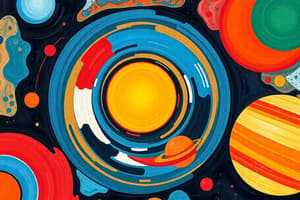Podcast
Questions and Answers
What is the farthest planet from the sun?
What is the farthest planet from the sun?
- Jupiter
- Uranus
- Saturn
- Neptune (correct)
Which planet is known for its prominent ring system?
Which planet is known for its prominent ring system?
- Saturn (correct)
- Neptune
- Jupiter
- Uranus
What is the largest planet in the solar system?
What is the largest planet in the solar system?
- Jupiter (correct)
- Uranus
- Neptune
- Saturn
Which planet is no longer considered a planet, but a dwarf planet?
Which planet is no longer considered a planet, but a dwarf planet?
Which planet is the hottest due to its thick atmosphere?
Which planet is the hottest due to its thick atmosphere?
Which planet has the potential for past or present life?
Which planet has the potential for past or present life?
What is the smallest planet in the solar system?
What is the smallest planet in the solar system?
Which planet is an ice giant, composed primarily of water, ammonia, and methane ices?
Which planet is an ice giant, composed primarily of water, ammonia, and methane ices?
Flashcards are hidden until you start studying
Study Notes
Overview of the Solar System
- The solar system consists of eight planets, five dwarf planets, and various smaller objects
- It formed around 4.6 billion years ago from a cloud of gas and dust called the solar nebula
The Eight Planets
- Mercury
- Closest planet to the sun
- Smallest planet in the solar system
- Highly elliptical orbit
- Venus
- Hottest planet due to thick atmosphere trapping heat
- Orbit is slow, rotating very slowly
- Earth
- Third planet from the sun
- Only known planet with life
- Mars
- Known as the Red Planet due to iron oxide in the soil
- Potential for past or present life
- Jupiter
- Largest planet in the solar system
- Gas giant, primarily composed of hydrogen and helium
- Saturn
- Second-largest planet
- Known for prominent ring system
- Uranus
- Ice giant, composed primarily of water, ammonia, and methane ices
- Tilted axis, resulting in extreme seasons
- Neptune
- Farthest planet from the sun
- Strongest winds in the solar system
Dwarf Planets
- Pluto: Once considered the ninth planet, now classified as a dwarf planet
- Eris: Located in the Kuiper Belt, slightly larger than Pluto
- Ceres: Largest object in the asteroid belt
- Haumea: Irregularly shaped, rapidly rotating
- Makemake: Highly reflective, icy surface
The Solar System
- Formed around 4.6 billion years ago from the solar nebula
- Consists of eight planets, five dwarf planets, and various smaller objects
The Eight Planets
- Mercury: smallest planet, closest to the sun, and has a highly elliptical orbit
- Venus: hottest planet due to its thick atmosphere, and has a slow rotation
- Earth: third planet from the sun, and the only known planet with life
- Mars: known as the Red Planet due to iron oxide in the soil, and has potential for past or present life
- Jupiter: largest planet, gas giant, primarily composed of hydrogen and helium
- Saturn: second-largest planet, known for its prominent ring system
- Uranus: ice giant, composed primarily of water, ammonia, and methane ices, and has a tilted axis resulting in extreme seasons
- Neptune: farthest planet from the sun, and has the strongest winds in the solar system
Dwarf Planets
- Pluto: once considered the ninth planet, now classified as a dwarf planet
- Eris: located in the Kuiper Belt, and is slightly larger than Pluto
- Ceres: largest object in the asteroid belt
- Haumea: irregularly shaped, and rapidly rotating
- Makemake: highly reflective, icy surface
Studying That Suits You
Use AI to generate personalized quizzes and flashcards to suit your learning preferences.




